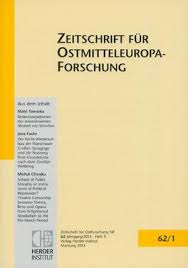Importierte Dinge und imaginierte Identität. Osmanische „Sarmatica“ im Polen der Aufklärung
Imported Things and Imagined Identity: Ottoman ‘Sarmatica’ in Enlightened Poland
Author(s): Dirk UffelmannSubject(s): Anthropology, Gender Studies, Ethnohistory, Political history, 18th Century, The Ottoman Empire
Published by: Verlag Herder-Institut
Keywords: Sarmatism; Ottoman sabres; self-Orientalisation; material metonymies; masculinity;
Summary/Abstract: This article combines methodological approaches from material culture, masculinity and postcolonial studies in a discussion of the crisis in the material self-representation of the ‘Sarmatian’ nobility in the late 18th century. The first part is devoted to how the male nobility fashioned itself as ‘Sarmatian’ with the help of material metonymies of Ottoman origin. How did imagined ‘Sarmatica’ contribute to positive self-Orientalisation? The second part is centred on material indices of the ideological crisis of Sarmatism in the second half of the 18th century and their implementation in the literary work of Franciszek Zabłocki, Jędrzej Kitowicz and Franciszek Karpiński. Thus emerges the hypothesis of a ‘saddle period’ in Poland’s relationship to the Orient around 1800 when pre-modern positive self-Orientalisation turned into something comparable to modern Saidian Orientalism.
Journal: Zeitschrift für Ostmitteleuropa-Forschung
- Issue Year: 65/2016
- Issue No: 2
- Page Range: 193-214
- Page Count: 22
- Language: German

